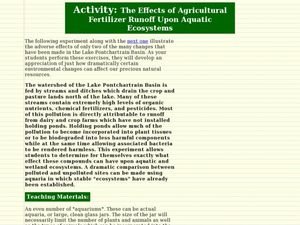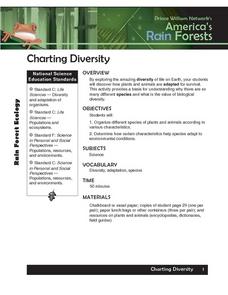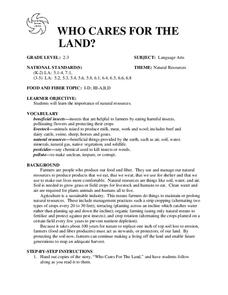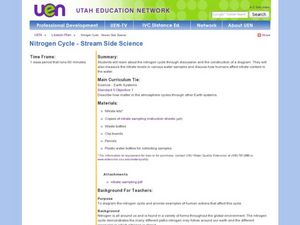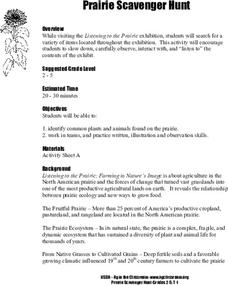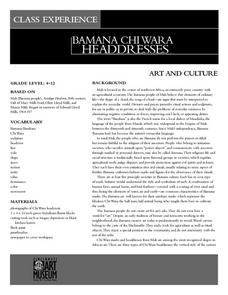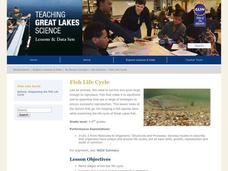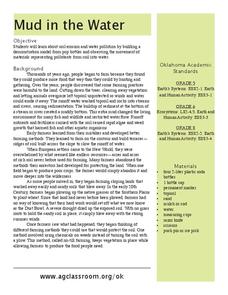Captain Planet Foundation
Worm Your Way Out of This
How can you provide healthy soil for your garden? Study worms, bacteria, and other microorganisms in a lesson about decomposition and organic compost. After discussing what you know about worms and watching a video, watch what worms do...
Curated OER
Prairie Scavenger Hunt
Middle schoolers take a close look at the prairie environment. They identify common plants and animals of the prairie. In addition, pupils work in teams in order to put together a presentation on a certain aspect of the prairie...
Curated OER
The Effects of Agricultural Fertilizer Runoff Upon Aquatic Ecosystems
Students measure the toxic levels of runoff and discuss the effects it would have on the aquatic system. In this runoff lesson plan, students answer questions to how runoff would affect the animals in an aquatic system.
Curated OER
Pollination Power
Students go out into the garden and observe pollinating animals through hand lenses. In this pollination lesson plan, students also discuss how animals carry seeds to create new plants elsewhere.
Curated OER
What's Organic?
Young scholars discuss background information presented by the teacher and read dictionary definitions for the words "organic" and "synthetic." In this gardengin lesson, students complete a worksheet on the material. Young scholars grow...
Curated OER
Factors Affecting Plant Growth
Students determine the physical and chemical factors that affect plant growth. In this biology lesson, students explain the role of hormones in plants. They investigate how competition with other plants affect their growth.
Curated OER
Inside the Egg, Hatching Chickens
Students conduct an egg candling activity to show the life inside a fertile egg. Students discuss the needs the egg has of the hen, as well as similarities and differences between plants and animals. Students complete a life cycle wheel...
Curated OER
Charting Diversity
Students organize different species of plans and animals according to various characteristics. Students then determine what characteristics enable them to survive in their habitat. Game ideas and activities are included.
Curated OER
WHO CARES FOR THE LAND?
Students explore the importance of natural resources. They are given copies of the story, "Who Cares For The Land," and students follow
along as the teacher reads it. Students identify the key points in the story. (Soil, water and air...
Curated OER
Sustainable Livestock
Students investigate healthy eating habits by researching livestock. In this food sustainability instructional activity, students research the negative impact factory farming has on our environment due to pollution. Students define...
Curated OER
Pesticide Watch Card
Young scholars examine human health by identifying dangerous pesticides. In this agriculture lesson, students research the food production system in the United States and discuss dangers such as pesticides, chemicals and insecticides...
Curated OER
Nitrogen Cycle-Stream Side Science
A thorough background and nitrate sampling lab sheet are provided to share with your young scientists. After discussing the nitrogen cycle with the class, you will break them into small groups and show them how to use their inquiry...
Curated OER
Prairie Scavenger Hunt
Students search for a variety of items while visiting a Listening to the Prarie exhibition.
Curated OER
Bamana Chi Wara Headdresses
Students create African headdresses out of styrofoam blocks and black paint using information gathered from the Bamana Chi Wara style of headdresses. This Art lesson can be adapted for many different levels.
Curated OER
Creating a Pollinator Garden
Learners build a pollination garden. In this pollination lesson, students read directions and build a pollinator garden that will produce flowering plants for pollinator organisms to use in pollination of other plants.
Curated OER
How Do Organisms Reproduce
Middle schoolers examine the difference between mitosis and meiosis, and describe the steps involved in meiosis and the significance of each step. They create a diploid nucleus containing two pairs of chromosomes using clay.
Curated OER
Parts of the Flower and Pollination
Students review the parts of the plant and recognize the parts that are important for pollination. In this pollination lesson, students illustrate and label the parts of a flower. Students compare different types of flowers.
Curated OER
Dragon Genetics-Independent Assortment and Genetic Linkage
Students build chromosome models using popsicle sticks. In this biology lesson, students simulate the Law of Independent Assortment. They use Punnett squares to predict the resulting genotype and phenotype.
Curated OER
Make Your Own Garden
Students explore gardening. In this Quiet in the Garden lesson plan, students read the picture book by Aliki and extend the lesson by taking part in up to 5 hands-on activities.
Michigan Sea Grant
Fish Life Cycle
Fish are no different when it comes to a living being's primary objective—to reproduce. They do differ, including from fish species to fish species, in their life cycles, survival tactics and reproductive strategies. After discussion of...
Curated OER
Utah's Biomes
Fourth graders discover what a biome is and study biomes that are native to Utah in this series of lessons. They examine how Utah's biomes have changed over time due to the influence of the Mormon pioneers and other human populations.
Curated OER
Food and You
Students identify why humans are dependent on natural resources and the problems associated with their use and demonstrate how humans affect their environment. They also describe the different components and natural resources that go...
Curated OER
Water Pollution
Students explore the causes of water pollution. In this environmental lesson, students conduct experiments with natural filtration systems.
Curated OER
Mud in the Water
Sixth graders investigate erosion. In this erosion lesson, 6th graders explore how farming changes the environment. Students construct an erosion model and research ways to protect the soil from excess mud generated by farming.




